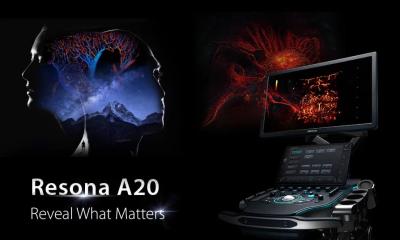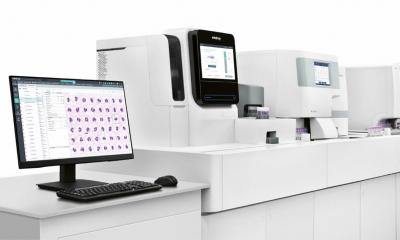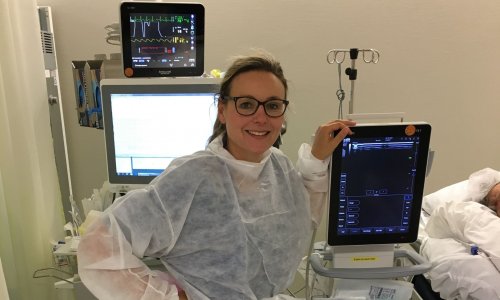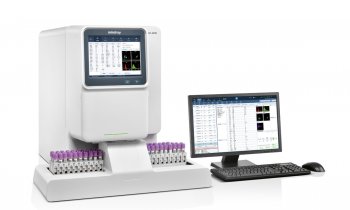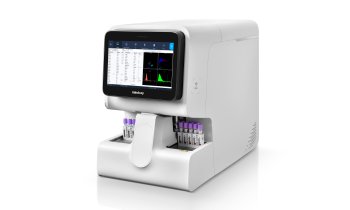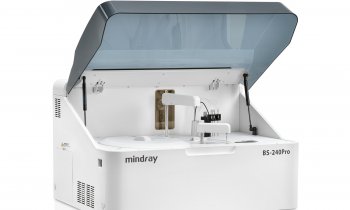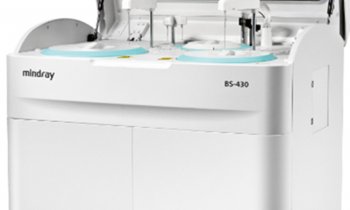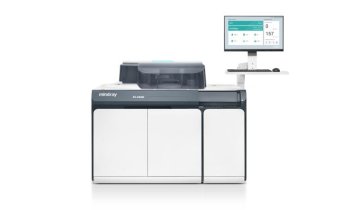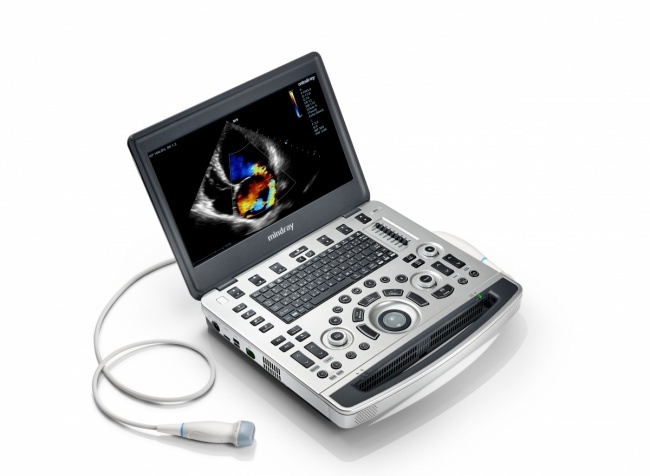
Sponsored • Point-of-Care
M9 brings maximum mobility
For medical ultrasound it’s quick, easy and portable – and so popular with Professor Christoph Dietrich, chief of Medical Department 2 at Caritas Hospital, Bad Mergentheim, one of the first physicians worldwide to test the M9 in clinical routine. ‘The compact Mindray colour Doppler system is about the same size as a notebook computer. The imaging suite comes to the patient,’ the specialist reports.
Located on the Tauber River in the quaint town of Bad Mergentheim, Medical Clinic Two focuses on haematology/oncology, palliative medicine, gastroenterology and herpetology, geriatrics, endocrinology and metabolic diseases and has an excellent reputation for specialised and innovative endoscopic and ultrasound techniques.
Dr Dietrich uses the M9 ultrasound system for any standard diagnostic exam, from head to toe, and simply opens up M9’s high-resolution 15 inch LED monitor for swift bedside exams. ‘Despite its compact design, the M9 offers outstanding image quality that’s definitely comparable to that of a stationary system,’ he happily reports. ‘It offers all image data needed in a general hospital or medical office environment.’
Above all the patented 3-T transducer technology provides excellent visualisation in b-mode and colour mode, Mindray adds. ‘It offers higher sensitivity and larger bandwidth as well as enhanced transmission efficiency and excellent signal-to-noise ratio. The single crystal probe technology allows imaging of deep structures. ‘Not only is the transducer state-of-the-art; the small and lightweight five kg system itself is chock-full of premium Mindray imaging technology, such as Echo Boost, High Dynamic Range Flow (HDR Flow) for visualisation of minute vessels and complex flow patterns, as well as the Natural Touch elastography package for reproducible and userindependent measurement of tissue elasticity. The professor highly values that ability to perform bedside exams. Where every second counts, particularly in emergency and trauma care, quick intuitive diagnostic tools are in high demand.
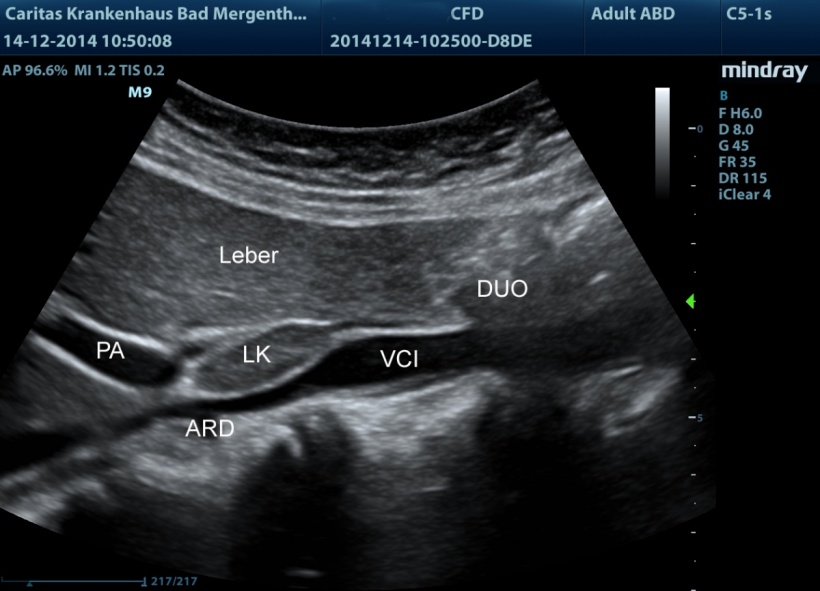
resolution. Liver, duodenum (DUO) and right renal artery (ARD) are also marked.
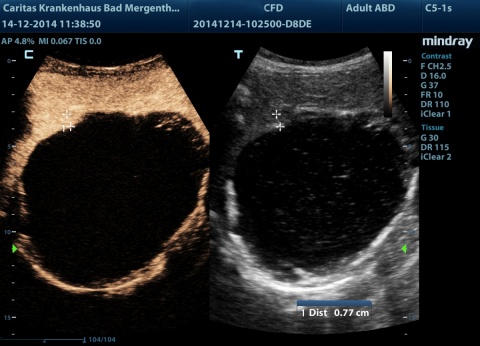
The mobility of current ultrasound devices has swiftly shifted them from an emergency modality to a primary diagnostic modality. Caritas Hospital is a certified regional trauma centre in the Northern Bavaria trauma care network. Prof. Dietrich cooperates closely with the emergency department. ‘Thanks to the M9’s portability and immediate usability we can immediately start radiography on an injured patient – even while other clinical tests are being performed. We unfold the M9, it’s up and running within seconds.’
To accelerate diagnostic work-up in trauma care, the ultrasound exam follows an internationally recognised standard, Focused Assessment with Sonography for Trauma, FAST for short. This rapid bedside screening test is designed to detect or exclude free fluid, mostly bleeding, in certain anatomical regions. ‘The procedure lists clear questions that can be answered with an unambiguous yes or no,’ Professor Dietrich explains. ‘By systematically imaging the entire abdomen the physician can tell, in less than a minute, whether free fluid is present or not.’
Even for abdominal contrastenhanced ultrasound (CEUS) the professor relies on the M9’s image quality. ‘With the M9 you can quickly detect or exclude a spleen, kidney or liver rupture. Two to three minutes after contrast administration you can see blood flow.’ For CEUS the M9 offers another advanced Mindray technology: Ultra Wideband Nonlinear Contrast Imaging. This transmission uses second harmonic as well as non-linear signals, which results in excellent contrast-to-tissue specificity.
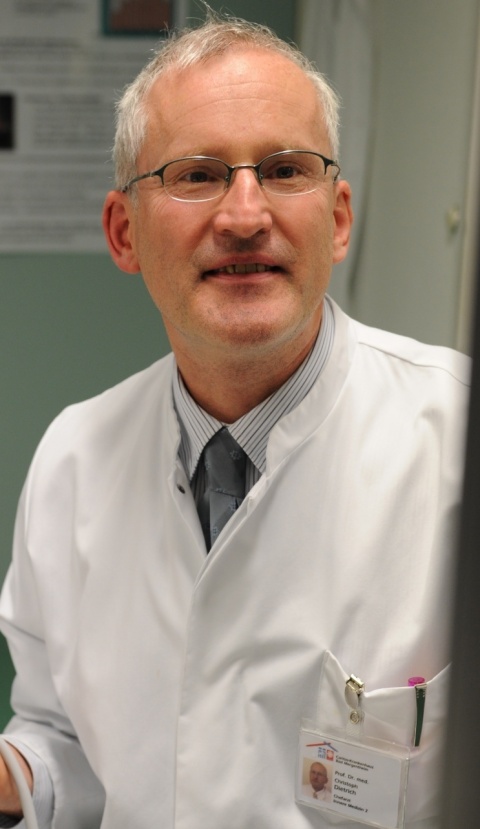
Prof. Dietrich is convinced that ultrasound, while still essential in a clinical setting, will continue to gain importance in disciplines such as intensive and trauma care due to mobility and POC availability.
M9 ASSETS
• Single crystal 3T transducer
• UWN+ Contrast Imaging (ultrawideband non-linear)
• HDR Flow (High Dynamic Range Flow)
• Natural Touch elastography
• LVO (left ventricular opacification) with stress echo
• Compatible with TEE transducers
• mQuadro ultrasound platform
Profile:
Current President of the European Federation of Societies for Ultrasound in Medicine and Biology (EFSUMB) Christoph F. Dietrich has been senior consultant at Caritas Hospital in Bad Mergentheim, Germany, since 2002. A German National Academic Foundation Scholarship enabled studies at Hanover’s Medical University. Additionally, in 1988 he passed the US-American FMGEMS exam. From 1997 he specialised in internal medicine and in 1999 received his habilitation. Professor Dietrich is also a certified specialist in several other disciplines, including gastroenterology and haematology/oncology.
06.03.2015
- congresses (699)
- contrast agents (144)
- elastography (89)
- imaging (1637)
- mobility (71)
- POCT (157)
- radiology (729)
- ultrasound (766)



